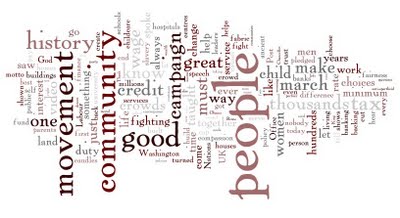Gordon Browns’ eve-of-election speech in May 2010 to Citizens UK was easily the best of his premiership, and must rank among the best in his career. Fiery, crusading and sincere it was a brief glimpse of the brilliance that the faithful always told us disbelievers was there. Had the preceding years not been so different and so the election result quite as catastrophic, it would easily be seen as one of the defining political speeches of recent times. As it was, its one year anniversary passed by completely unnoticed last week. In fact, the speech doesn’t even feature in Steve Richard’s totemic history of Brown, Whatever It Takes. But I think it’s worth taking a look at again, as it suggests a few things: about Brown, his party – yes, but also centre-left government in general.
On a purely technical level the speech is pretty exemplary. It builds momentum and a sense of urgency with rhetorical tricks such as triple repetition (a la Thatcher’s "No, No, No" or Blair’s "weak, weak, weak"): "When people say…when people say…when people say"; "you will always find in me a friend, a partner, a brother" and so on. The quick but consistent pace at which it moves means the past (civil rights, anti-apartheid), the present (living wage, Obama) and the personal (Brown’s family) are effortlessly woven together where it’s so easy to get it wrong and look crass or opportunist – ask Ed Miliband after his TUC address.
These are all age-old devices, but the reason they work for Brown is because the delivery feels so genuine and passionate - confident but not choreographed or staggered in the way so many political speeches are these day, no inbuilt pauses for applause or for focused grouped soundbites to sink in. Brown subsequently achieves what most modern politicians can only dream of: to appear ‘on our side’, to be inspiring, even poetic - to deliver a political sermon in a very secular age. It’s a testament in my view to Brown’s status as the most fascinating, complicated politician of his generation that this all came from the mouth of the same clunky, emotionally constipated bloke-on-the-telly everyone became used to; "an analogue politician in a digital age" as Cameron once chided him.
But it’s the politics of it which are most interesting to me. Look at the actual words he constantly uses – "fight", "march", "movement", "community". These are all phrases that would give ‘Third Wayers’ and triangulaters a heart attack. They’re also the diametric opposite of the a-political, ‘father of the nation’ image he had been determined to maintain through his premiership. Where previously Brown tried to meet the Tories inheritance tax cut half-way, here he clearly denounces it and builds that opposition into his own world view. For proof, compare the different word clouds (I know I should leave the house more) below of this speech and his conference speech just eight months prior, which is instead dominated by the more recognisable and vacuous New Labour touchstones of "change", "new", "choice", a sense of empowerment and place substituted for the more expressionless "country", "Britain", "world" and so on. Both rhetorically and politically, Brown had let go.
Now I know he was very much preaching to the converted with Citizens UK, but I’m not convinced it would put ‘swing voters’ off in the way many may claim – or certainly no more than he already had done so. I think most British people can countenance a bit of aggression and tub-thumping as long as it’s perceived as owing to passion rather than pantomime (think PMQs). Nothing Brown said was too abstract and its underlying moral convictions would be shared by most, I think.
In exact policy terms the speech may have reflected the rather tired nature of Labour’s manifesto, but the section from 6:00-6:49 does have the beginning of a decent narrative on public services: one that goes beyond being transactive/technocratic but also rejects Cameron’s false dichotomy between state and society, by placing government investment and community alongside one another where they belong ("building together, investing…"; "your hospitals, your schools, your children’s centres upon which communities are built").
Finally, there’s a whole generation who came of political consciousness during the fag end of the Blair years who – if, like me, they weren’t born into a Labour family – came to see Labour as the establishment party. Daft I know, but they certainly looked, acted and sounded like it to us at the time. This is just a faint echo of what a new study shows is the biggest problem social democratic parties in Europe face: people simply do not trust them to challenge invested interests anymore. Above all else the success of Brown’s speech, with its insurgent tone on inequality and poverty, shows centre-left parties that just because you’re in government doesn’t mean you have to become synonymous with the establishment, or even make peace with it. You can still be constantly at war with the status quo and constantly campaigning against the forces which make it up – you can still be part of a movement, essentially ("Let’s march, together")*.
Rescuing the standing of social democracy may be the only bigger task than rescuing that of Brown’s – at least we can be pretty sure Brown’s decline has bottomed out. But whatever exact form centre-left renewal ends up taking, it must surely start by trying to resuscitate what briefly sparked into life on that Monday night in South London last May.
Gordon Brown speech to Citizens UK, May 2010

Gordon Brown speech to Labour party conference, September 2009

*Incidentally it’s been noted before that some of Obama’s problems up until recently came from ignoring this: he never defined himself against Wall Street, for instance, even though public opinion permitted him to, he never harnessed his unprecedented campaign resources (and ethos) in government and so on. Anyone more tuned in to US politics than I am these days got any thoughts on this?